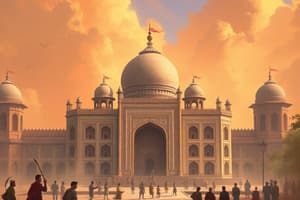Podcast
Questions and Answers
What administrative system was established by Akbar, which was based on rank rather than land?
What administrative system was established by Akbar, which was based on rank rather than land?
- Monarchy system
- Zamindari system
- Mansabdari system (correct)
- Feudal system
Who is best known for commissioning the Taj Mahal as a tomb for his late wife?
Who is best known for commissioning the Taj Mahal as a tomb for his late wife?
- Jahangir
- Akbar
- Shah Jahan (correct)
- Aurangzeb
Which empire successfully resisted Mughal rule and emerged as the dominant power in the Deccan region?
Which empire successfully resisted Mughal rule and emerged as the dominant power in the Deccan region?
- Marathas (correct)
- Sikhs
- Rajputs
- Afghans
What led to the decline of the Mughal Empire under Aurangzeb's rule?
What led to the decline of the Mughal Empire under Aurangzeb's rule?
What was the British East India Company's primary advantage during the decline of the Mughal Empire?
What was the British East India Company's primary advantage during the decline of the Mughal Empire?
How did the Mughal Empire transition towards its end?
How did the Mughal Empire transition towards its end?
Who was the founder of the Mughal Empire?
Who was the founder of the Mughal Empire?
In which battle did Babur defeat Ibrahim Lodhi to establish the Mughal Empire?
In which battle did Babur defeat Ibrahim Lodhi to establish the Mughal Empire?
Which Mughal ruler introduced the syncretic religion din-i-ilahi?
Which Mughal ruler introduced the syncretic religion din-i-ilahi?
What was the main focus of Akbar's military campaigns during his reign?
What was the main focus of Akbar's military campaigns during his reign?
Which region was NOT incorporated into the Mughal Empire through Akbar's military campaigns?
Which region was NOT incorporated into the Mughal Empire through Akbar's military campaigns?
What was the main goal of Akbar's policy towards religious and cultural identities in India?
What was the main goal of Akbar's policy towards religious and cultural identities in India?
Flashcards are hidden until you start studying
Study Notes
The Rise and Reign of the Mughal Empire
The Mughal Empire, a vast expanse that stretched across the Indian subcontinent, ushered in a new era of power and prosperity. Its reign, spanning from the 16th to the 18th century, left an indelible mark on the region's history, culture, and architecture.
Origins and Founding
The Mughals, a dynasty of Central Asian Turco-Mongol origin, hailed from the house of Chingiz Khan. Babur, a direct descendant of Tamerlane, established the empire in 1526 after defeating the last of the Delhi Sultanate, Ibrahim Lodhi, in the First Battle of Panipat. Babur's son, Humayun, briefly succeeded him, but his reign was short-lived due to political instability. The throne was then reclaimed by Humayun's son, Akbar, who would go on to consolidate the empire's power and establish the foundations of a prosperous era.
Akbar's Reforms and Policies
Akbar (1556-1605) was a visionary leader who sought to unify India's diverse religious and cultural identities. He forged alliances with Hindu and Jain nobles, co-opting them into the Mughal administration. Akbar also introduced the practice of din-i-ilahi, a syncretic religion that combined elements of Hinduism, Sikhism, Jainism, and Islam. Although din-i-ilahi did not survive Akbar's death, it paved the way for religious tolerance in the empire.
Akbar's military campaigns expanded the empire's boundaries, incorporating regions such as Bengal, Assam, and the Deccan. He also established a stable and centralized administration, known as mansabdari, which was based on rank rather than land. Akbar's successor, Jahangir (1605-1627), and his grandson, Shah Jahan (1628-1658), continued to expand the empire's territories through military campaigns.
Famous Mughal Emperors
Shah Jahan is perhaps best known for commissioning the Taj Mahal, a magnificent tomb for his late wife Mumtaz Mahal. The Taj Mahal, completed in 1653, is a UNESCO World Heritage Site and one of the most recognizable architectural marvels in the world. Aurangzeb (1658-1707), Shah Jahan's son and successor, continued the empire's expansion, but his religious zeal and policies eventually led to its decline.
Decline and End of the Empire
Aurangzeb's aggressive conversion policies and protracted war with the Marathas weakened the empire. The Marathas, a confederation of Hindu kingdoms, successfully resisted Mughal rule and eventually emerged as the dominant power in the Deccan region. The British East India Company, seeking to establish trade posts in India, also took advantage of the Mughal Empire's decline, gradually extending its influence across the subcontinent.
The Mughal Empire did not disappear entirely but transitioned into a more decentralized form, where Mughal emperors retained symbolic authority while local rulers exercised actual power. The legacy of the Mughal Empire, however, remained paramount, contributing to the cultural and architectural landscape of modern India and beyond. Its impact on art, literature, and politics remains apparent.
In summary, the Mughal Empire was a powerful and influential force that shaped the history, culture, and architecture of the Indian subcontinent. From its origins in the 16th century to its decline in the 18th century, the empire left an indelible mark on the region's history, paving the way for the British Raj and the establishment of modern India.
Studying That Suits You
Use AI to generate personalized quizzes and flashcards to suit your learning preferences.




